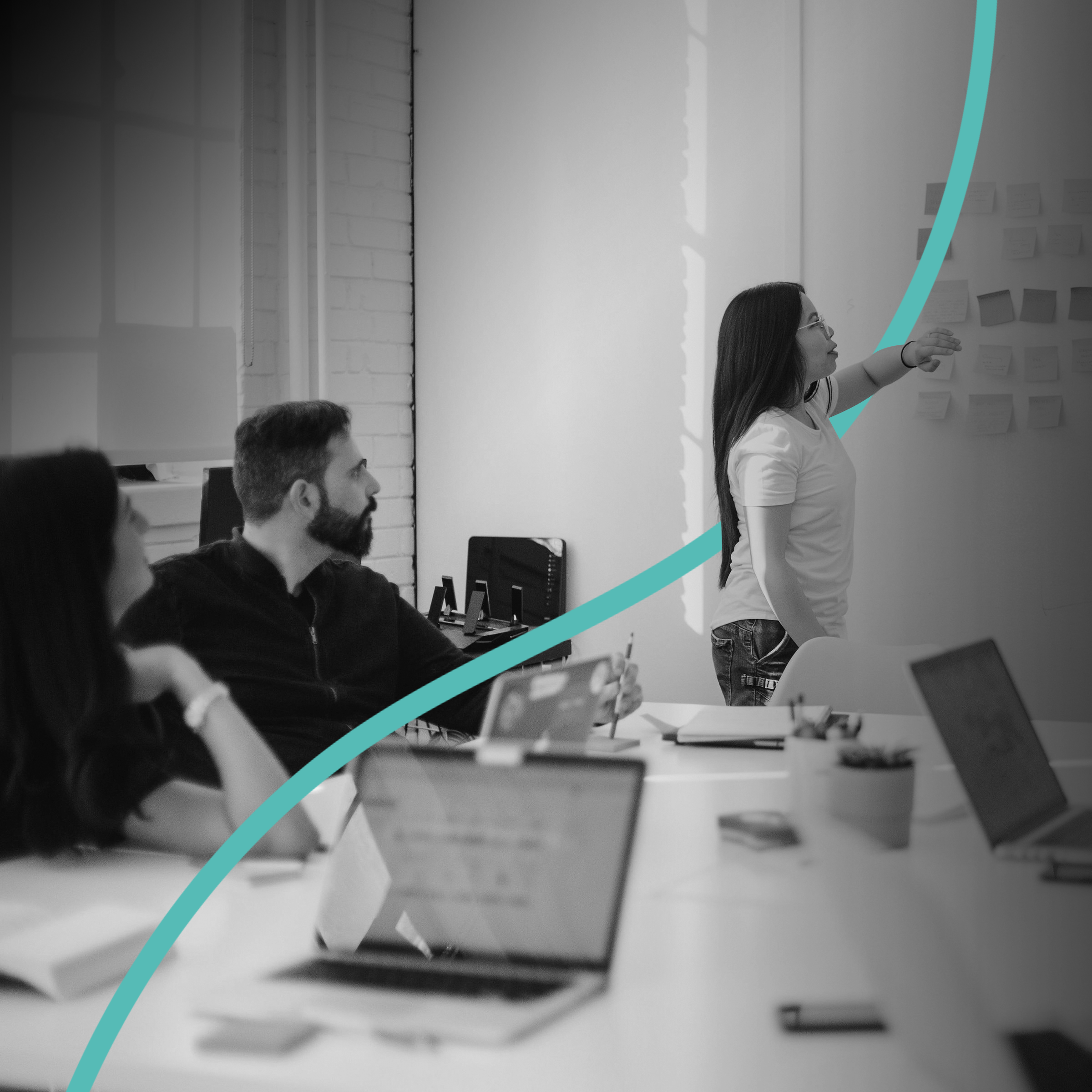
Findings For The Field
Culturally Responsive and Sustaining Education

What is Culturally Responsive and Sustaining Education?
At Teaching Lab, we believe that any student can learn anything when their cultural and linguistic identities are viewed as funds of knowledge and assets that can aid in the process of learning. In SY20-21, Teaching Lab began to bring a more explicit focus on Culturally Responsive and Sustaining Education (CRSE) practice into its professional learning programming offered across the nation. Through this process, Teaching Lab has become a leader in aligning CRSE and curriculum-aligned professional learning, partnering not only with CRSE experts like Dr. Julia Aguirre and Dr. Gholdy Mohammad, but also with teachers themselves through Teaching Lab’s Teacher Advisory Board to create and pilot tools and professional learning experiences that incorporate a CRSE lens.
Specifically, in SY20-21, Teaching Lab:
Engaged teachers across the country through our Teacher Advisory Board to understand challenges teachers and schools face when learning and implementing CRSE practices and to ensure our professional learning experiences are developed for and by teachers.
Carried out a pilot focused on Culturally Responsive and Sustaining Education and implementing the EL Education (EL) curriculum, or what we call a CRSE & HQIM PLC, with 72 teachers from New York City’s District 11.
Revised our evaluation plan and identified areas and instruments where we will incorporate the evaluation of CRSE mindsets and practices for SY21-22.
Piloted CRSE items from the Culturally Responsive and Sustaining EducationCulturally Responsive Teaching Self-Efficacy scale to improve our evaluation of CRSE practices.
Infused a culturally responsive focus into our State-Level High-Quality Professional Learning Fellowship with the support and thought-partnership of Kao Moua Her.
Developed and piloted sessions within our introductory Bootcamp professional learning to explore the concepts of mathematical identities, effective teaching practices, and equity to deepen educators’ critical consciousness related to instruction.
Through these experiences, we’ve learned that teachers want and need knowledge building and practice opportunities related to CRSE and that district and system leaders also need dedicated and focused learning on cultural responsiveness. In SY21-22, we look forward to a continued emphasis on CRSE across all of our work.

Teacher Advisory Board
Teaching Lab established the Teaching Advisory Board (TAB) in the spring of 2021 to ensure that Teaching Lab’s professional learning programs and content are developed “for teachers, by teachers” to solve for the most important challenges they face with the end goal of advancing educational equity for students across our nation.
Made up of 15 teachers across four states who instruct or support all grade-bands of ELA or mathematics, TAB has especially informed Teaching Lab’s development of CRSE professional learning experiences by providing insight into how teachers understand CRSE as well as challenges for its implementation at both the classroom and school levels.
TAB not only advises Teaching Lab’s program and content development but also builds a community of teachers among its members. Alice Ng, 7th grade math teacher in New York City, describes her experience in TAB:
“We have a lot of diversity of experiences when it comes to CRSE practices. Even as a new group, we are already supporting and giving advice/strategies to each other to improve … there have already been moments of teacher joy that have grown out of connection, shared learning, and sharing solutions and strategies.”
In SY21-22, Teaching Lab looks forward to expanding TAB as a community of teachers and amplifying its role in the ongoing development of Teaching Lab’s professional learning experiences by using human-centered design principles.

New York City’s District 11
Teaching Lab has developed an ongoing partnership with District 11 in the Bronx, New York City. In the spring of 2021, Teaching Lab designed and carried out a five-session learning sequence that was part of a professional learning community (PLC) focused on Culturally Responsive and Sustaining EducationCulturally Responsive Teaching (CRSE) and implementing the EL Education (EL) curriculum, or what we call a CRSE-EL PLC, with 72 teachers from District 11.
This virtual PLC provided educators with an opportunity to build and apply knowledge of CRSE practices. The series was designed to equip teachers with the knowledge and skills to successfully implement CRSE in their daily instructional practices including planning, assessment, and student-facing instruction. Teachers used each of their students’ unique cultural identities and skill sets to encourage academic achievement, cultural competence, and sociopolitical consciousness.
Adrianne Sublett, Interim Director, New Products & Services - ELA, was instrumental in designing this series and reflected:
“I have so many different emotions about this work because I feel like this is it. This is how we can really transform education and help support teachers in ways that they haven’t really been supported before.”
Teachers’ reactions and learning from the CRSE-EL PLC were also overwhelmingly positive:
Participants approved of and were very satisfied with the CRSE PLC. Specifically, over 95% of participants agreed that the topics were relevant, facilitation was clear, the facilitators built a community of learners, they felt a sense of community in the virtual environment, and they would apply what they learned in the PLC to their teaching practices.
Participants reported increasing their knowledge surrounding CRSE practices after the PLC, especially those related to identifying differences between school and students’ cultures, using students’ previous knowledge to help make sense of new information, and revising instructional material and adapting instruction with a CRSE lens, as the figure below illustrates.
In a focus group, participants commented that they felt they could be honest, share, and connect with fellow teachers in Teaching Lab’s CRSE PLC.
Felecia Kelly, fifth grade teacher, expressed:
“The space that was created that really felt like a safe space for teachers to open up, and even though we didn't know each other, to really just engage in that kind of conversation, and to get personal at times. So thank you.”
Participants reflected that Teaching Lab’s CRSE PLC, in conjunction with other CRSE workshops and activities, including a design series focused on Dr. Gholdy Muhammad’s framework, pushed participants to think more broadly of CRSE; whereas before many teachers only focused on race, they reflected that a student’s identity and culture also encompass other aspects such as religion and their community. Participants also learned about the importance of their own identity work. Stefanie Sanabria, kindergarten teacher, commented that CRSE requires “bringing knowledge of our own biases, and how they influence in the classroom.” Felecia Kelly added:
Between Gholdy’s book club and Teaching Lab, I feel like even for us as individual teachers, it made us look inside of ourselves for our personal views on identity. And it's like, almost impossible now for me to go through any day teaching and not not find a way to incorporate “How does this fit in with identity?” with my students and come up with a question to end off the period. With that, it's like it's just constantly in the front of my brain. ...I don't even have to have it in a lesson plan anymore, which I feel like that should be like, like an ultimate goal.
Participants also mentioned that they realized their focus on culture previous to this CRSE work was surface level and isolated. As second grade teacher Marangele Rios stated,
“Whereas before, I think, you know, I looked at culture kind of superficially, I was able to really understand like other aspects of culture, and then break that into, like our planning sessions for next year. I love the culture tree that we have explored during one of our sessions.”
Additionally, teachers appreciated the time dedicated in the PLC to understand what CRSE is, unpack what was learned, and find ways to incorporate it into the curriculum and classroom. One teacher highlighted this in a focus group:
“I just think…a lot of times we attend PD, and there's never that concrete time to work with someone unpacking what was just done. For that real life practice in your classroom. It's a lot of theory, theory, theory, spirit, spirit spirit, but [I wonder], ‘How do I do this? [How do] new teachers [do this]?...What do I do with this information?’ So allowing that time [is so important]. [We had] a great opportunity [during the PLC where the facilitator gave us] that time in groups to look at our lessons, look at our units to unpack it collectively with others within our district, because everybody has different experiences. So you gain a lot of knowledge that way.”
For the SY2021-2022, participants are planning their lessons from a CRSE lens, looking for opportunities to incorporate deeper aspects of culture, being aware of how things are phrased that may inhibit some students’ understanding, proactively exposing students to other cultures, and making sure students are experiencing joy in the classroom.
Administrators have also observed a shift in teachers mindsets and practices. Daniel Russo, Deputy Superintendent, commented that the change “really comes down to...the bravery of teachers to tackle topics and literature around topics, unapologetically.”
“…change really comes down to … the bravery of teachers to tackle topics and literature around topics, unapologetically.”
— Daniel Russo, Deputy Superintendent, District 11 NYC
He also expressed appreciation for how the CRSE work “has helped teachers and leaders think about how you can honor the curriculum, its structure all of the the work and research that has been put into the product but deliver it in a way that feels like it's the right fit for your students at the right time.” Russo added, “we're happy that we have a partnership that is so aligned, and that we're now at a place where we're seeing the benefits of a sustained partnership, surfacing themselves naturally in the learning process, and not in such an orchestrated way.”
Teaching Lab looks forward to revising the PLC series based on participant data, feedback from the district partners, and additional research and learning and launching additional cohorts in the FY22 programmatic year.
Table of Contents:
-

Participant Feedback
-

Educator Mindsets
-

Content Knowledge
-

Teacher Practices
-

External Evaluation
-

Student Work
-

CRSE
-

State-Level Program
-

Field Contributions
-

Looking Forward
-

Media Toolkit

Findings For The Field
Accelerate Teacher Learning = Accelerate Student Learning

